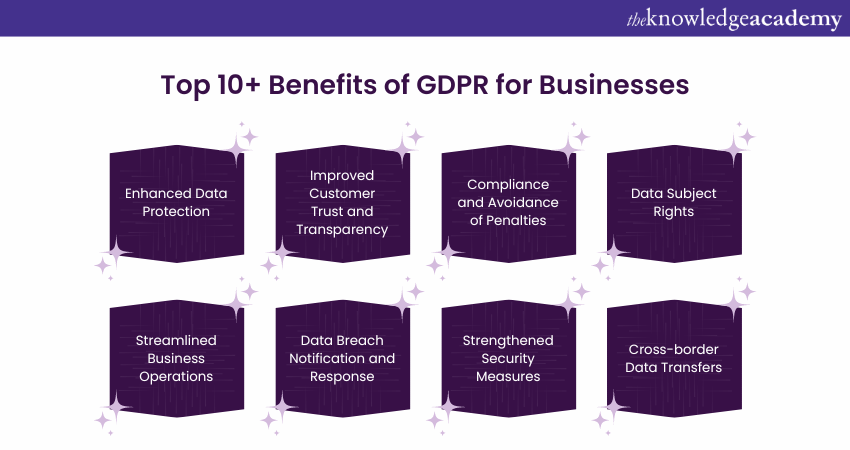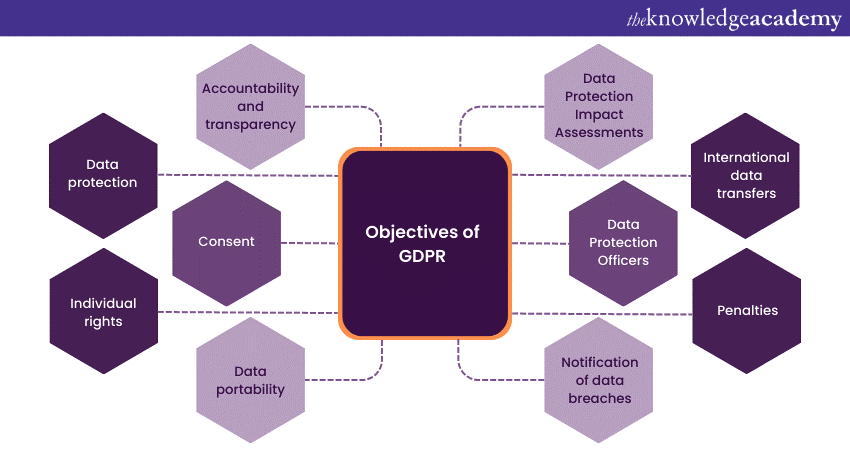We may not have the course you’re looking for. If you enquire or give us a call on +44 1344 203 999 and speak to our training experts, we may still be able to help with your training requirements.
Training Outcomes Within Your Budget!
We ensure quality, budget-alignment, and timely delivery by our expert instructors.

At a time when data breaches are alarmingly frequent, protecting personal information is more vital. But do you know how the benefits of GDPR can revolutionise your business? From boosting customer trust to optimising data management, GDPR Compliance provides a multitude of advantages that can drive your business forward.
In this blog, we’ll talk about the top 10+ Benefits of GDPR for businesses, highlighting how this regulation can protect your data and foster innovation. Let’s dive in and discover how embracing GDPR can create a more secure, efficient, and customer-focused business environment!
Table of Contents
1) Various Benefits of GDPR for Businesses
a) Enhanced Data Protection
b) Improved Customer Trust and Transparency
c) Compliance and Avoidance of Penalties
d) Data Subject Rights
e) Streamlined Business Operations
f) Data Breach Notification and Response
g) Strengthened Security Measures
h) Cross-border Data Transfers
i) Training and Awareness
j) Global Business Opportunities
2) Objectives of GDPR
3) Key Principles of GDPR
4) GDPR Compliance: Rounding it all up
5) Conclusion
Various Benefits of GDPR for Businesses
General Data Protection Regulation is one of the most important regulations in the digital world that has affected all companies around the globe. Effective on May 25, 2018, GDPR addresses the rights of private data of individuals within the EU and holds many pro-business features. So, let’s explore some of the key Benefits of GDPR for Businesses:

1) Enhanced Data Protection
Increased attention to the protection of information retains the confidentiality of data useful to different organisations. It also contributes to the development of customer confidence and often the compliance of the company with legal requirements. It helps to preserve the data and reduce the occurrence of breaches reducing the risk for business and preserving their image on the market.
2) Improved Customer Trust and Transparency
Transparency is a key aspect of GDPR. The regulation mandates that businesses be clear and transparent about collecting, storing, and processing personal data. This increased transparency fosters trust between businesses and their customers. When individuals are confident that their data is being handled responsibly, they are likelier to engage with businesses and share their information.
3) Compliance and Avoidance of Penalties
Compliance with this framework is not only essential for maintaining customer trust but also for avoiding significant penalties. So, if your organisation isn’t compliant, it can result in hefty fines.
This can further severely affect a business’s reputation and financial stability. By adhering to GDPR, businesses can minimise the risk of penalties and legal consequences, ensuring continued operations.
4) Data Subject Rights
GDPR also grants individuals several rights concerning their personal data, including the right to access, rectify, and erase their data. Businesses must establish mechanisms to handle data subject requests and provide timely responses. By respecting these rights, businesses can build trust and demonstrate their commitment to Data Protection.
5) Streamlined Business Operations
While this legal framework imposes certain compliance requirements, it also encourages businesses to adopt more efficient and streamlined data management practices. By implementing GDPR-compliant processes, businesses can make sure that data is collected and processed in a structured and organised manner. This not only helps businesses operate more efficiently but also reduces the risk of data breaches and potential legal consequences.
6) Data Breach Notification and Response
Under GDPR, businesses are obligated to promptly inform individuals and relevant authorities in case of a data breach. This proactive approach to data breaches helps businesses take necessary steps to mitigate the impact and protect affected individuals. Therefore, businesses can maintain customer’s trust and loyalty by being transparent about a GDPR Data Breach and promptly responding to incidents.
Learn about the essential tools and insights to navigate the complexities of Data Protection - join our Certified EU GDPR Foundation and Practitioner Course.
7) Strengthened Security Measures
This legal framework also places significant emphasis on incorporating strong security measures to protect personal data. Businesses are required to assess and update their security protocols regularly, ensuring data confidentiality, integrity, and availability.
This focus on security helps businesses fortify their defences against cyber threats and potential data breaches. By adhering to GDPR security requirements, businesses can enhance their overall Data Protection posture.
8) Cross-border Data Transfers
The GDPR imposes stringent requirements for transferring personal data outside the EU. Businesses must guarantee that appropriate safeguards are in place. It’s essential for companies to consider these requirements when transferring data to countries with less stringent Data Protection laws. By adhering to GDPR Requirements, businesses can maintain the integrity and security of personal data during cross-border transfers.
9) Training and Awareness
The framework necessitates training and awareness sessions to ensure that employees understand their responsibilities on Data Protection. Therefore, businesses can foster a data protection culture by educating employees on GDPR Principles and best practices. They can also ensure that everyone contributes to maintaining compliance.
10) Global Business Opportunities
GDPR is not limited to businesses within the EU. Even organisations operating outside the EU can benefit from this framework by aligning their Data Protection practices with its standards. By demonstrating a commitment to data privacy and protection, businesses can expand their customer base and explore new opportunities in the global market. Further, its compliance can enhance a company’s reputation as a trustworthy and responsible entity, attracting international customers and fostering international business relationships.
11) Competitive Advantage
Compliance with this framework can provide a competitive advantage for businesses. By highlighting a commitment to safeguarding customer data and privacy, businesses can differentiate themselves from competitors. Customers are likelier to choose businesses that prioritise data security and privacy, leading to increased customer loyalty and trust.
12) Increased Accountability
GDPR also promotes accountability in Data Protection practices. Businesses are needed to document and maintain records of their data processing activities. This includes information about the legal basis for processing, data retention periods, and measures taken to ensure data security.
By promoting accountability, it encourages businesses to adopt responsible data-handling practices and maintain compliance with regulatory requirements.
Understand data protection and how to implement EU GDPR-compliant programmes by signing up for GDPR Certification now!
Objectives of GDPR
The objectives of the General Data Protection Regulation (GDPR) are:

a) Data Protection: To standardise and strengthen Data Protection laws in the European Union (EU) for secure and lawful personal data processing.
b) Individual Rights: To empower individuals with greater control over their data, including the right to access, correct, and delete their information.
c) Accountability and Transparency: To assess obligations on organisations to be transparent about data processing actions and accountable for data breaches.
d) Consent: To establish precise requirements for obtaining and managing individuals' consent for data processing.
e) Data Portability: To allow individuals to quickly move their data from one service provider to another.
f) Data Protection Impact Assessments (DPIAs): Organisations should be mandated to evaluate and address potential risks linked to their data processing activities.
g) Data Protection Officers (DPOs): It is recommended to appoint Data Protection Officers to guarantee compliance with organisation Data Protection regulations.
h) Notification of Data Breaches: To mandate the prompt notification of data breaches to both affected individuals and relevant authorities. i) International Data Transfers: To ensure adequate protection, regulate the transfer of personal data outside the EU and European Economic Area (EEA).
j) Penalties: Significant fines should be imposed to encourage organisations to take Data Protection seriously for non-compliance.
Protect your business from potential threats with our GDPR Awareness Training – book your spot now!
Key Principles of GDPR
The following are the key principles of GDPR:
a) Lawfulness, Fairness, and Transparency: Processing confidential data must be done fairly, lawfully, and transparently. Individuals must be informed of how their data is used.
b) Purpose Limitation: Personal data must only be collected for lawful purposes.
c) Data Minimisation: Personal data should be limited to what is necessary for the stated goal.
d) Accuracy: Ensuring that confidential data is correct and up-to-date is crucial. Whenever necessary, the data should be corrected or deleted without delay.
e) Storage Limitation: Personal data should only be kept for as long as necessary to achieve the intended purpose.
f) Integrity and Confidentiality: It is crucial to ensure that personal data is processed securely, guarding against unauthorised access, disclosure, or destruction. g) Accountability: Organisations must acknowledge their data processing activities and showcase their adherence to the GDPR.
GDPR Compliance: Rounding it all up
GDPR compliance offers significant benefits that go beyond merely meeting regulatory obligations. By ensuring legal compliance, organisations can avoid substantial fines and penalties while meeting all regulatory obligations within the GDPR scope. This adherence not only safeguards the business but also builds a foundation of trust with customers. Additionally, improving your reputation through a strong commitment to data privacy can enhance customer loyalty and trust, signaling to the market that the organisation takes data protection seriously. This reputation boost is complemented by enhanced operational efficiency, as GDPR compliance often leads to simplified data management processes and improved data quality and accuracy, streamlining operations and reducing errors.
Moreover, conducting a GDPR risk assessment is vital for securing sensitive information and preventing potential data breaches. By identifying and mitigating risks, organisations can protect both their assets and customer data, further strengthening their position in the market. This comprehensive approach to data protection also provides a competitive advantage, helping businesses stand out to privacy-conscious customers who value security and transparency. In today's marketplace, where privacy concerns are paramount, GDPR compliance can be a decisive factor in attracting and retaining customers, ultimately contributing to long-term business success.
Conclusion
The Benefits of GDPR for businesses are vast and transformative. By embracing GDPR, you can protect your data, build stronger customer relationships and drive innovation. Start leveraging the power of GDPR today and watch your organisation thrive!
Master the complexities of Data Protection and compliance by investing in our Certified Data Protection Officer (CDPO) Course now!
Frequently Asked Questions

GDPR enhances Data Protection, fostering trust with customers. It simplifies data management processes, reduces security breaches, and ensures compliance with international standards, potentially opening new markets.

GDPR standardises Data Protection across EU countries, ensuring safe and legal data transfers. It builds trust and reduces legal complexities, making international business operations smoother and more efficient.

The Knowledge Academy takes global learning to new heights, offering over 30,000 online courses across 490+ locations in 220 countries. This expansive reach ensures accessibility and convenience for learners worldwide.
Alongside our diverse Online Course Catalogue, encompassing 17 major categories, we go the extra mile by providing a plethora of free educational Online Resources like News updates, Blogs, videos, webinars, and interview questions. Tailoring learning experiences further, professionals can maximise value with customisable Course Bundles of TKA.

The Knowledge Academy’s Knowledge Pass, a prepaid voucher, adds another layer of flexibility, allowing course bookings over a 12-month period. Join us on a journey where education knows no bounds.

The Knowledge Academy offers various GDPR Trainings, including the Data Privacy Awareness Course, GDPR Awareness Training, and Personal Data Protection Bill Training. These courses cater to different skill levels, providing comprehensive insights into GDPR Changes.
Our IT Security & Data Protection Blogs cover a range of topics related to GDPR Benefits, offering valuable resources, best practices, and industry insights. Whether you are a beginner or looking to advance your Information Technology (IT) Security and Data Protection skills, The Knowledge Academy's diverse courses and informative blogs have got you covered.
Upcoming IT Security & Data Protection Resources Batches & Dates
Date
 Certified Data Protection Officer (CDPO)
Certified Data Protection Officer (CDPO)
Thu 1st Jan 1970







 Top Rated Course
Top Rated Course



 If you wish to make any changes to your course, please
If you wish to make any changes to your course, please


